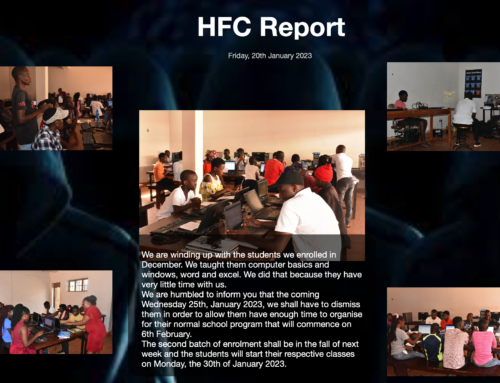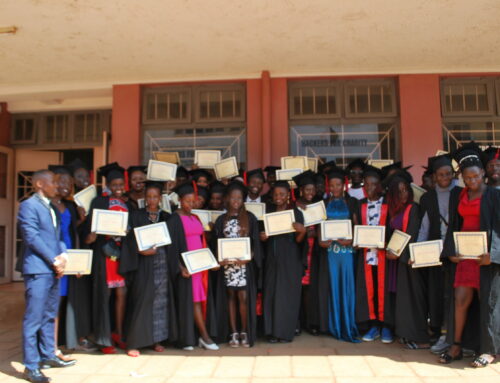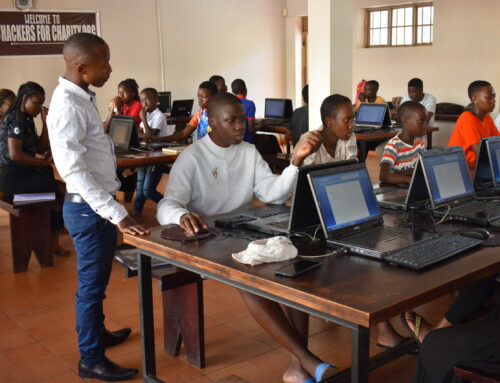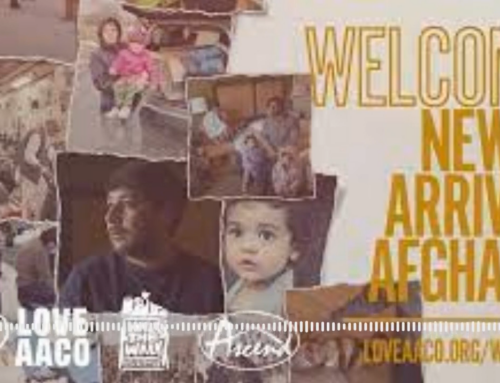I missed DEFCON. I couldn’t afford to go. I couldn’t justify spending the money to fly from Africa. It made me feel unplugged from things… or should I say MORE unplugged. I’ve tried for years to connect the skill of the hacking community to unmet needs in the NGO / charity world. I’ve yet to figure out how to do it, and that frustrates the crap out of me.
I’ve had hundreds of people tell me that HFC is a “great idea” and that they want to help, and short of bringing them to Uganda to work with me on the ground, I have nothing to offer them. My stock answer is “send money, get on the mailing list, and spread the word”. I get asked all the time if we can use excess gear. Here in Africa, I can use it, but taxes and shipping stress our tiny budget to the limit. I’ve often said, “Yeah, hold on to that gear. I’m going to find a way to get it to local charities that need it.” Somewhere, I imagine people are hoarding equipment in the hopes that I’ll come through on that statement, but I haven’t. I don’t even remember who had what or where they were.
I tried a kind of forum (thanks for the effort, Zate) that sorted “charities” and “hackers” and that project fell over, mostly because I wasn’t available enough to help push it.
We’ve gotten a couple of shipments through (thanks Tim, Chris, Dean, Keith, Nathan) and that equipment (and HFC cash donations) culminated in a training center and two classrooms, but the training center is an abject failure, and is bleeding money because we don’t have enough customers and our prices are too low (free is a variant of low). People are learning and getting access to training that should (but won’t on our watch) cost six months wages, but we’re headed for bankruptcy as a result.
I recently learned about “Random Hacks of Kindness” (RHOK, http://www.rhok.org). An organization that uses “hackers” to “develop software solutions that respond to the challenges facing humanity today”. I read about their international “hackfests” where developers created software solutions to “save lives and alleviate suffering”. In their short time on the scene, they’ve gone international, pulled together hundreds of coders and done something… collaboratively. They’ve garnered quotes from none other than Vint Cerf:
“Random Hacks of Kindness goes to the heart of what we believe at Google, that the creative and cooperative use of technology can help make the world a better place. Collective intelligence is strength, and if you supply free food, developers will come.”
They have none other than Google, Yahoo, Microsoft, NASA and the World Bank as “founding partners” and these organizations have put their collective weight behind a “hacker” charity.
Don’t get me wrong. It seems they are doing good stuff. “Well done,” I say. But their success is somehow like sand in my underpants. Technically speaking, they’re using the word “hacker” properly. So that’s not what bugs me. It’s just that their success shines a bright light on the fact that despite our (my?) popularity in the “real” hacker community, HFC has done little relative to our collective capability.
We can throw an 802.11 signal a world-record distance of 275km using junk hardware. We can rootkit Android before it’s released, hack GSM, hijack global DNS, pick every lock on the planet, beat international news agencies to the punch, and weed our way into previously untrodden shadows of the digital world. There is amazing skill in our community. We build robots just because we can, and tweak just about every technology on the planet to unbelievable ends. We are motivated and brilliant. We are self-organizing and ultra-productive when assaulting “impossible” projects. We break, bend, and then re-create the rules. But can we really, honestly do some good in the world? My answer used to be a resounding “YES!” Now, my answer is a much-too-passive “Maybe”.
Yes, with me and my family on the ground here in Uganda, some positive things have happened (http://www.hfc-uganda.org). But is that work reflective of the power of our community? Hardly.
I accept the lion’s share of the blame for that. I’m not an organized person. I don’t have big, sweeping, clear visions of the future. I’m just a guy that went completely off the rails when I saw first-hand how valuable my skills were in a developing country. But that was then. These days, with my skills atrophying and my relevance in the community waning, I’m afraid I’ve just become another oddball character in the tome of hacker history. I wish I could have figured out the magic formula to cash in my visibility and popularity in the community for a movement that would be much bigger than the sum of it’s parts. I wish that after a year here in Uganda I could point to one project, regardless of how small, and say, “There! Look at that! See? It’s working! We’ve done it!” I wish I could point to one person and honestly say that HFC improved the quality of his or her life. But I really can’t. Success by that definition utterly eludes me.
On a personal note, our rent in Uganda just doubled. The increase will take intense financial “creativity”. I mention that only because it’s another element of why I’m scratching my head right now… wondering what, exactly we’re supposed to be doing.
So here I sit. And wait.
Psalms 62:5 all the way.
I hope I can mentally quiet down long enough to hear a thing or two.
Oh, and I launched a forum.
It was reflexive, and probably pointless.





I know an engineer working on an affordable refrigeration project over in the area, and if he continues to ship materials over there, perhaps there is a way we can match some donated equipment up with his materials flights. Let me know if you can identify some of those people with equipment to give, I’ll try to work something out.
Your frustration depression stress, while real, is just the Devil trying to break you down. The Devil is a liar!
You have such a big heart. I remember not too long ago about you writing of the numbers of people who were being given food, medicine and basic education because of money and help that came through HFC. In fact, I think you even created a video. I think it also had something to do with the initial group AOET(?) and kids were getting sponsored now because of coding help from the community. That was so heart-warming. It made me feel really good to know that somewhere over “there” a child would not be going to bed hungry because of the $ I donated. May be you should go back and watch some of your videos. Go back and get inspired again. I know you have a really big heart and want to do really big things over there, but have you considered scaling back to the simple things? Not because the other ventures are expensive but because as much as computer skills are needed in order to get out of poverty, but so is so much of the other work you started out doing. Remember Matthew 25:23
You and your family are always in my prayers. God will lead you and direct you. Keep praying for His Will and listen.
Finally, remember always – Delight yourself in the Lord and he will give you the desires of your heart – he just didn’t say how long that would take. :-)
Johnny,
Can you give us some idea of the shortfall on the project, specifically for your family to continue to do your work there? I certainly do not want to see my brother in Christ or his family, suffer, when they are clearly doing the work He has called them to do.
Impact? I still remember you clearly covering the importance of the Gospel during your intro slide @ a con a few years ago “Christian by Grace.” I was so impressed that I decided that I should start doing that as well, during my sessions. Think of all the people who may have never heard of God’s Grace before this thing started, because of your effort.
Hang in there! Phil 4:13
Thank you for the raw honesty. I’m sure you knew that it wouldn’t be an easy journey but then again maybe the learning is so much more than skillz. Keep the faith.
Don’t give up! Things have a way of working out in the end. Call it God or Karma, but all of your hard work will pay off.
The payoff might not be something you expect, but it will come.
Hi,
I’ve just come across the website by chance and have to say that I was very moved by this article. You’re intentions are noble and I wish you all the strength to go on. Never give up.
Best,
Ced
Have you tried the Acumen Fund? Jacqueline Novogratz, the fund’s creator and CEO was on CNN this morning, talking about how she left Wall Street to pursue helping to make the world a better place for everyone. One of her ideas was this fund.
You ought to try reaching out to her, as she was also doing work in Africa, when she bailed on Wall Street.
For what it’s worth. Keep fighting the good fight, brother!